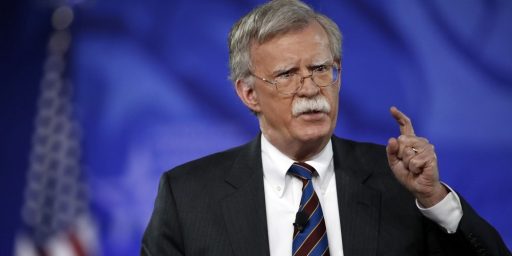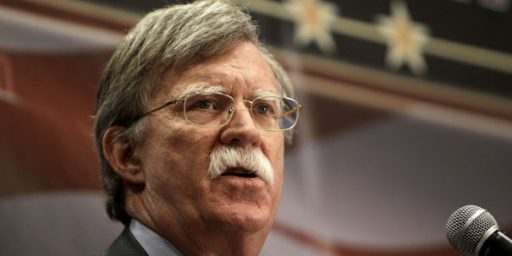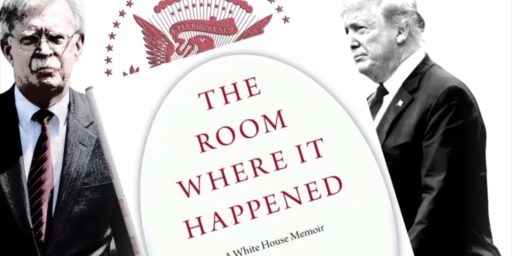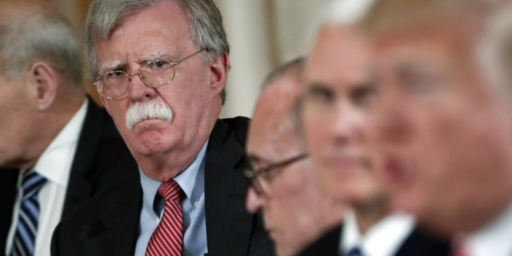Intelligence, Bureaucracy, and Groupthink
 Former UN Ambassador John Bolton argues that we need to get the bureaucracy out of intelligence if we are to adequately assess the threats facing the country.
Former UN Ambassador John Bolton argues that we need to get the bureaucracy out of intelligence if we are to adequately assess the threats facing the country.
Although the U.S. intelligence community (IC) has been stung by failures relating to the Christmas terrorist attack, these failures are symptomatic of far larger problems. In analyzing the ongoing Iranian and North Korean nuclear weapons programs, both the IC and policy makers are guilty of politicizing intelligence, exactly the behavior harshly criticized during the Bush administration.
Now, however, the politicization threat dwells inside the IC, especially in the Director of National Intelligence (DNI) bureaucracy. Policy officials move in and out of intelligence jobs as if those jobs were interchangeable, carrying all their existing policy biases. Even worse, intelligence officers increasingly disdain to hide their philosophical proclivities, which have colored their intelligence analysis in years past. And, like generals refighting the last war to correct their mistakes, the IC is reacting against charges it overstated the threat of Iraqi weapons of mass destruction by understating the threat of Iranian and North Korean weapons programs. So much for the wall of separation between policy and intelligence.
Ill-concealed policy preferences dominated the now-discredited 2007 National Intelligence Estimate (NIE) on Iran’s nuclear weapons program. So eager were the NIE’s drafters to forestall the use of force against Iran that they distorted the intelligence, ignored contrary evidence, and overstated their conclusions.
[…]
The Christmas terrorist attack demonstrates that we need more effective communication and analysis within the IC. Achieving this goal does not require more centralization of authority, more hierarchy, and more uniformity of opinion. The IC’s problem stems from a culture of anonymous conformity. Greater centralization will only reinforce existing bureaucratic obstacles to providing decision makers with a full range of intelligence analysis.
The problem is often not the intelligence we collect, but assessing its implications. Solving that problem requires not the mind-deadening exercise of achieving bureaucratic consensus, but creating a culture that rewards insight and decisiveness. To create that culture we should abolish the DNI office and NIEs.
Eliminating the DNI should be accompanied by reversing decades of inadequate National Security Council supervision of the intelligence function. The council is an awesome instrument for presidential control over the IC, but only if the national security adviser and others exercise direction and control. Sloughing off responsibility to the bureaucracy embodying the problem is a failure of presidential leadership, and unfortunately gives us exactly the IC we deserve.
Contemporary NIEs (and other IC products) reflect the bureaucracy’s lowest-common-denominator tendencies and should be abolished. Each intelligence agency should be able to place its analysis of data into a competitive marketplace of classified ideas—this will help determine which is the superior product.
While Bolton’s assessment of the problem — bureaucratic consensus yields a CYA mentality and discards brilliant ideas that are either outliers or risky — is correct, his solution does little to solve it. We had these same problems without a DNI, after all; indeed, that’s why we have a DNI.
And it’s well and good to say we shouldn’t have an NIE, since it’s necessarily going to be a namby pamby collective report. But Bolton’s alternative is to present the president with a dozen or more namby pamby collective reports. Perhaps that will be better for assessing blame afterwards — some agencies will be closer to right than others — but it will make it much harder to make decisions.
Nor is it clear what the NSC is going to do about all of this. The people sitting in that room are some of the best of the best. But they’re ultimately representatives of the agencies that sent them.






I think the real trick if finding a balance between the bureaucrats and the political appointees. Yes, bureaucrats can act as a drag on the system, but ‘brilliant idea’, agenda-driven appointees can gum up the works, too. Worse, they can take programs into entirely bad directions. Not all ideas are good ideas, after all…
Ah just another clogged heart artery in the aging empire. What ever will the system do?
Will it change it’s diet radically, quit smoking, and exercise regularly?
Nah…My guess will be heart felt declarations of reform….followed by more juicy steaks, golf once a month, and afterward a nice little port with a Havana.
Eventually the intelligence failure will lead to a major city and it’s inhabitants vaporized one crisp fall day. ( Then our elite clowns will have a commission to study the failure and declare it was really nobody’s fault)
Short of the emergence of an Augustus or a Diocletian,I am afraid there is little the clowns we as a people currently chose as leaders, can do to stave off the unpleasantness to come.
The only competent national institution of any major impact that we have left, is the military. And our democratically elected leader Mr Obama is getting ready to cut the military to the bone.
Diocletian, huh? I hope you’re not suggesting that some sort of military coup would be good for us. In any event, I’m not sure a Diocletian is someone you’d want for your man on horseback:
All this aside, I find it amusing, kinda, that John Bolton, one of the most ideological persons you could find, bemoaning the influence of ideology on intel gathering and dissemintation:
While I’m certainly sympathetic to the idea that our Intelligence Services are convoluted and overly bureaucratic. I think it comes back to the idea of whether you can be 100% safe and will more bureaucracy help or hurt.
The fact that it is John Bolton saying it though means this is probably wrong. He is part of that Rumsfeld – Cheney group that has been consistently wrong about pretty much everything over the last 10 years or so. It is hard to take anything he says seriously (now that he is out of the government anyway.)
There are many helpful techniques in intelligence gathering and predicting future actions but in the end is still and art. It will never be perfect. However it should be the best we can come up with and that is where the debate should fall.
I have an issue with giving of only one side or one agency evaluation. Competing views should be given and the record of those agency\groups\individuals should be taken into account. It is also a balancing act on how much info is past between groups. Understand that it will not be perfect.
CYA is a big issue. The way to greatly diminish that is to understand and to allow them to make mistakes. In the end you will end up with a much better IC . Perfect, no but much better than what we have now. The only way not to miss a shot in basketball is to never take one.